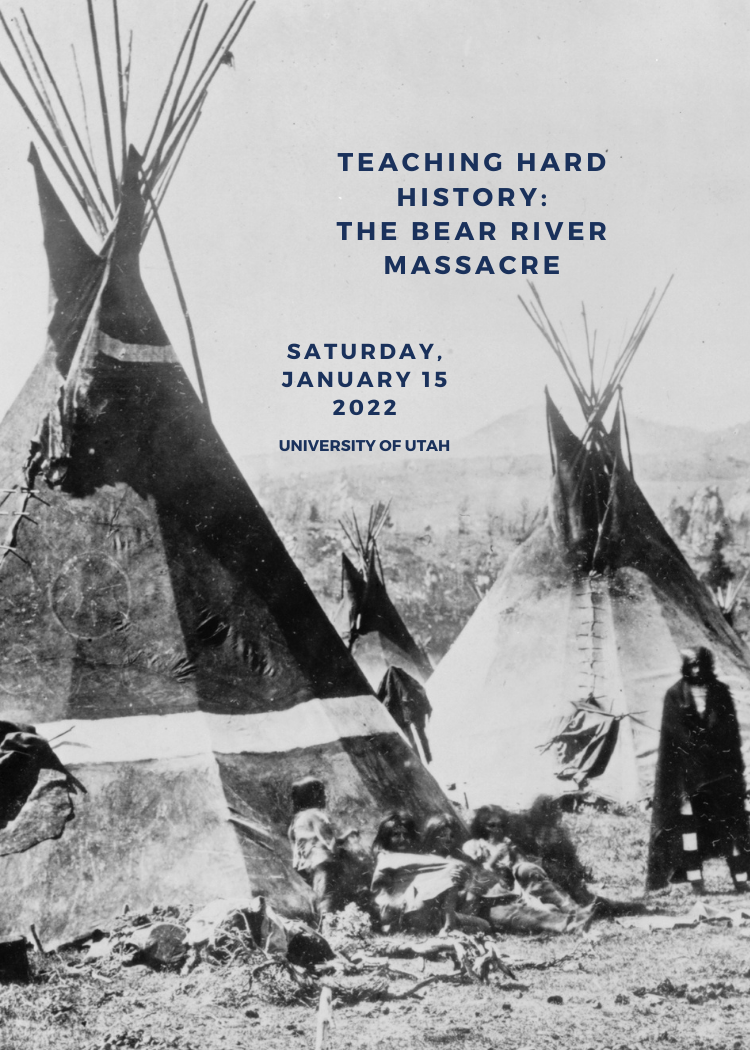CALL FOR APPLICANTS: TEACHING THE BEAR RIVER MASSACRE
By October 19, 2021
The Rocky Mountain American Religion Seminar invites applications to participate in a historical teaching seminar, “Teaching Hard History: The Bear River Massacre.” The seminar will be held in person on January 15, 2022, from 9 AM to 4 PM, at the University of Utah. The seminar will provide all materials necessary to participate. Applications are due on December 7, 2021.

On January 29, 1863, the United States Army killed between 250-400 Northwestern Shoshone men, women, and children in what is today Preston, Idaho. The event has been labeled a “battle,” suggesting that both sides were equally aggressive in preparing for violence. Indeed, until February 2021, the memorial established by settlers to commemorate the Army’s violence called it the “Battle of Bear River” rather than the “Bear River Massacre.” In the decades following the Massacre, the Shoshone homesteaded, joined The Church of Jesus Christ of Latter-day Saints. They have also kept the memory of “Boa Ogoi,” the Shoshone name for the Massacre, alive through oral and community histories.
The workshop will gather middle and high school teachers and graduate students to model how to teach settler/indigenous encounters in Utah, focusing on the Bear River Massacre. Students will learn the historical contexts of the Massacre, its historical afterlives, and how religion has shaped the Northwestern Band of the Shoshone since 1863.
Joseph Stuart, a Ph.D. Candidate at the University of Utah, will lead the morning’s meetings. He will outline the historical backdrops of the Bear River Massacre from multiple perspectives but centering on the lives of the Northwestern Band of the Shoshone. He will also model a primary source activity for educators to use in the classroom.
In the afternoon, Darren Parry (Northwestern Shoshone) will share his family’s and peoples’ history in the decades following the Bear River Massacre. The afternoon will conclude with a primary source activity on historical memory adaptable to classroom settings.
Before attending the seminar, attendees will be expected to read a provided copy of Parry’s book, The Bear River Massacre: A Shoshone History.
To apply to participate, please send an email with the following information to jstuartteaching@gmail.com:
- Your name, phone number, and email address
- The name of the school where you teach (or the name of your academic institution if you are a student)
- A short CV
- 2-4 sentences on how attending the workshop will help you as an educator
Applications are due on December 7, 2021. Travel stipends are available for those driving more than 20 miles to attend. Lunch will be provided.
Recent Comments
Steve Fleming on BH Roberts on Plato: “Interesting, Jack. But just to reiterate, I think JS saw the SUPPRESSION of Platonic ideas as creating the loss of truth and not the addition.…”
Jack on BH Roberts on Plato: “Thanks for your insights--you've really got me thinking. I can't get away from the notion that the formation of the Great and Abominable church was an…”
Steve Fleming on BH Roberts on Plato: “In the intro to DC 76 in JS's 1838 history, JS said, "From sundry revelations which had been received, it was apparent that many important…”
Jack on BH Roberts on Plato: “"I’ve argued that God’s corporality isn’t that clear in the NT, so it seems to me that asserting that claims of God’s immateriality happened AFTER…”
Steve Fleming on Study and Faith, 5:: “The burden of proof is on the claim of there BEING Nephites. From a scholarly point of view, the burden of proof is on the…”
Eric on Study and Faith, 5:: “But that's not what I was saying about the nature of evidence of an unknown civilization. I am talking about linguistics, not ruins. …”